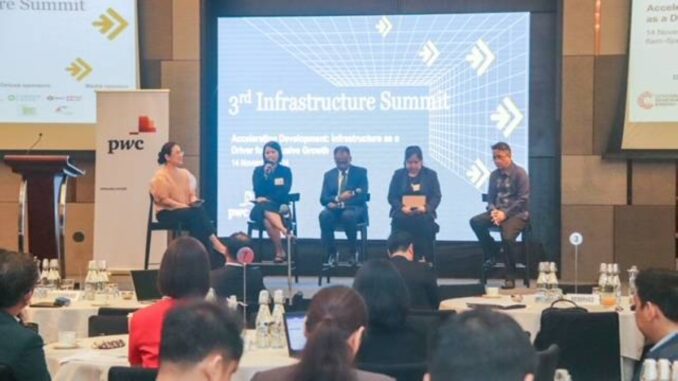
THE Philippine Infrastructure Summit, led by PwC Philippines and the Public-Private Partnership Center (PPPC) on November 14, highlighted the crucial role of infrastructure in meeting urgent decarbonization targets for the Asia-Pacific (APAC) region. Industry leaders emphasized the need for immediate action to combat climate change through sustainable infrastructure development.
From left are Mary Jade Roxas-Divinagracia, CFA®, CVA, Deals and Corporate Finance managing partner at PwC Philippines; Jennifer Tay, partner and Asia Pacific Infrastructure leader at PwC Singapore; Lavan Thiru, executive director at Infrastructure Asia; Cynthia Hernandez, executive director of the Public-Private Partnership Center; and Roderick Planta, assistant secretary at the National Economic and Development Authority at the 3rd Philippine Infrastructure Summit during the panel discussion. PHOTO FROM PWC
A wake up call
Jennifer Tay, partner and APAC Infrastructure leader at PwC Singapore, presented a stark reality: the APAC region is responsible for 48 percent of global carbon emissions with 17 percent directly attributed to infrastructure development.
She outlined the critical goal for the region: “To limit global warming to 1.5 degrees, the world needs to decarbonize at a rate of 17.2 percent year-on-year. This means that the Asia Pacific needs to move six times faster than its current pace.”

Jennifer Tay, partner and Asia Pacific Infrastructure leader at PwC Singapore, leads a session on Global and Regional Trends in Inclusive Infrastructure Development at the 3rd Philippine Infrastructure Summit. PHOTO FROM PWC
This situation presented APAC countries with a complex challenge: balancing energy security, affordability and sustainability in their transition to cleaner energy sources.
Echoing this urgency, Mary Jade Roxas-Divinagracia — CFA®, CVA for Deals and Corporate Finance managing partner at PwC Philippines — stated, “As one of the most climate-vulnerable countries, the Philippines must lead in implementing climate-resilient, inclusive and sustainable infrastructure. This is not just a wake-up call; it’s a mandate for immediate, transformative action.”
The role of the public and private sectors
PwC Philippines Chairman and Senior Partner Roderick Danao emphasized the critical role of public-private collaboration in advancing the country’s infrastructure goals.
He stressed: “To achieve inclusive and sustainable social and economic development, our country needs to attract more foreign direct investments with a greater focus on manufacturing.”
He called for efficient implementation of ambitious projects, underscoring the need for a shift from a consumer-driven to an industry-led economy. He emphasized that this transition, supported by forward-thinking infrastructure, was crucial for the Philippines to realize its projected economic growth and become the 15th largest economy by 2050 as forecasted by the World Bank.
The Philippine government has been actively promoting private sector involvement to transform the economy.
Undersecretary Angel Ignacio of the Office of the Special Assistant to the President for Investment and Economic Affairs highlighted the administration’s commitment to an investment-led economy, emphasizing an open foreign direct investment (FDI) policy framework.
She stated, “This administration is committed to harnessing the private sector to transform our economy to an investment-led one. Our policy framework for FDI is the most open and liberal it has ever been.”
The government has been focusing on key sectors, including renewable energy, tourism, semiconductors and electronics, mining and mineral processing, food and agriculture, pharmaceuticals and medical devices, and steel. Various government agencies have been contributing to this effort.
Cynthia Hernandez, executive director of the PPPC, highlighted water, waste management and renewable energy as priority sectors for investment to build a robust, environmentally conscious economic foundation.
As the APAC region grappled with its significant carbon footprint, the role of innovative, sustainable infrastructure development continued to be increasingly critical. The insights shared at the third Philippine Infrastructure Summit provided a roadmap for accelerating decarbonization efforts with infrastructure at the forefront of this vital transition.


Be the first to comment